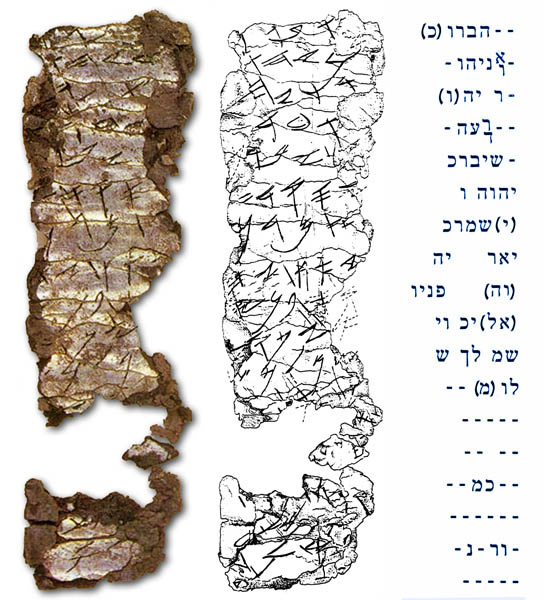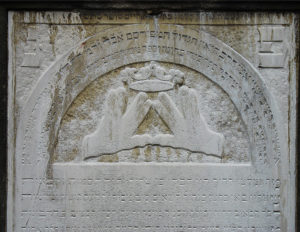In Numbers 6:22-27, we read (NRSV):
22 The LORD spoke to Moses, saying: 23 Speak to Aaron and his sons, saying, Thus you shall bless the Israelites: You shall say to them,
24 The LORD bless you and keep you;
25 the LORD make his face to shine upon you, and be gracious to you;
26 the LORD lift up his countenance upon you, and give you peace.
27 So they shall put my name on the Israelites, and I will bless them.
This prayer is one of the most widely used scriptures in both Jewish and Christian traditions. It is often used as a Benediction (closing prayer) in my current congregation, Agape Fellowship. In my former congregation in Indiana, it was often sung, sometimes spontaneously, as a way of blessing someone with a birthday, a graduate, or someone moving away from the community.
What is the context of this prayer? What is its meaning? Why is it used so often?
The prayer itself is in verses 24-26. But the “wrapper” in verses 22-23 and verse 27 gives us the context. The children of Israel have been delivered from slavery in Egypt. They have been given the Torah, God’s Law or “Word” which becomes the constitution, the foundation of their life as a community of God. Now, they are getting ready to enter the promised land. As they prepare, the sons of Aaron are the priests, the mediators of God’s Word to the people. Although the prayer is often called “The Priestly Prayer,” it is actually the word of God, spoken by the priests on God’s behalf. It states God’s intentions for God’s people.
Verse 27 indicates that by this word, God places the name of God on the people of God. Putting the name of God on the Israelites indicates God’s claim of ownership on the people. The command in v. 23, “Thus you shall bless the Israelites,” become God’s own word in v. 27: “I will bless them. The first words spoken by the priests are “The LORD bless you…”
In 1979, a tiny piece of jewelry was discovered in Israel during an archaeological dig. It turned out that putting God’s name on a person was taken literally. The piece of jewelry was a tiny silver scroll from the period of the first Temple in Jerusalem. On it, parts of this prayer could be deciphered. It was probably worn on a necklace or in some other way. It symbolized God’s name being literally on the person. This is the oldest Biblical manuscript ever found.

So how does God bless the people of God? Let’s look briefly at each of the three lines.
24 The LORD bless you and keep you
“Bless” is the Hebrew word, ḇârak, whose root meaning is to kneel. When people bless God, it carries the word picture of kneeling in worship. When God blesses people, it signifies that God stoops down from heaven to give the benefits of who God is to the people of God. God’s gifts are always good. These are internal benefits given to the community just because they are God’s people.
External benefits are described as God “keeping” the people. Here the root meaning has to do with making a hedge around the people so that enemies are kept away. God guards His people, attends to their needs, and protects them from evil. Psalm 121 is a particularly strong statement with a form of the word, “keep” used many times.
25 The LORD make his face to shine upon you, and be gracious to you
A more puzzling picture is God making his face shine upon the people. Yet, it recalls the fact that “God is light” and envisions that light shining from the face of God onto each child of God, just as the sun shines down from the sky on each person. This offers another picture of God’s protection or salvation. As Psalm 31:16 says, “16 Let your face shine upon your servant; / save me in your steadfast love.”
God’s light shines on us not because we earn it or deserve it but simply because of the grace or graciousness of God. Here is another word picture of mercy and kindness as God stoops down to offer grace to each of us as mere human beings, sinful human beings at that.
At the same time, God’s shining face is not automatic. God makes it clear in Deuteronomy and elsewhere that our turning away from God means, in effect that God’s face is hidden from us. “[The LORD] said: I will hide my face from them, / I will see what their end will be; / for they are a perverse generation, / children in whom there is no faithfulness.” (Deuteronomy 32:20 NRSV) God doesn’t force a shining face on us. His turning away is actually the result of our turning away.
26 The LORD lift up his countenance upon you, and give you peace.
Here is another picture of God’s smiling face or “countenance.” When someone lifts their head and smiles at you, it signals a positive healthy relationship. When a person looks down and doesn’t meet your eye, it generally means something is not quite right in the relationship.
God’s uplifted face signals God’s peace. It is a peace not only meaning the absence of conflict, but rather, the full flavor of the Hebrew word, shalom, which is so central to God’s purposes for God’s people. Shalom is most often translated “peace,” but means good health, good relationships with others, enough provisions for sustaining life, and all bound together by a good covenant relationship with God.
Among the most important times when Israel heard these three lines of prayer from the lips of their priests was on the Day of Atonement. The blessing comes at the end of an elaborate service of worship in which the High Priest enters the Holy of Holies, confesses the sins of the people, offers sacrifices of thanksgiving and receives assurances of being “At one” or atoned for by God. The Priestly Prayer is God’s way of saying once more, “You are my people, called by my name, blessed, protected, shined upon, and given the fullness of shalom.
In Jesus Christ, this yearly ritual has been enacted once for every people in every time and place. At-one-ment has been accomplished through Jesus’ death on the cross. Yes, we can (and still often do) turn away via our thoughts and actions. In the current days, we are seeing more clearly that shalom has been broken by the nationalism, materialism, militarism, and racism even by us who want to claim the name of Jesus. Yet, the Holy Spirit calls us again to turn around and come back. We come to the Creator God through our Great High Priest, Jesus. As we repent of our modern idols and “isms,” and lift our faces toward God, God can lift up his face upon us and give us true peace in all of our relationships.
